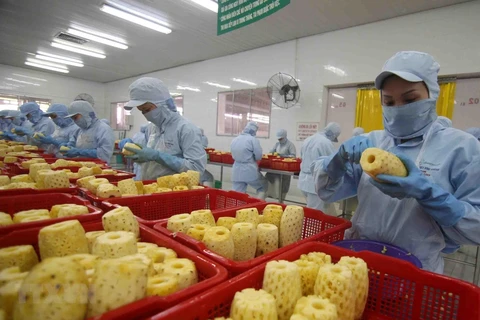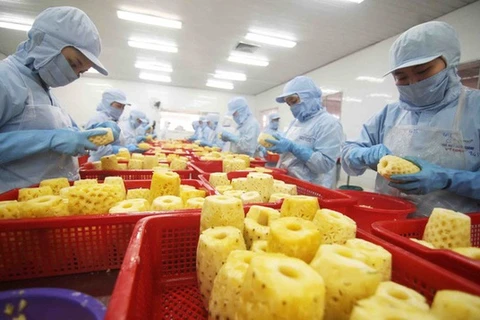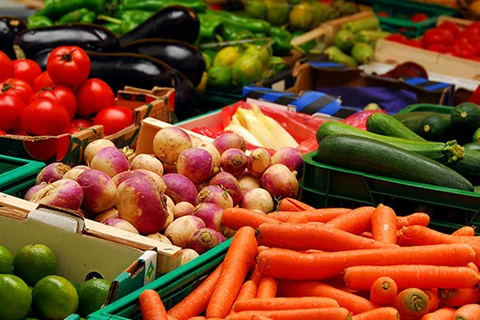HCM City (VNA) – Vietnamese vegetables and fruits are eyeing various potential markets from Asia to Europe, and from the Middle East to North America and America, in which quality requirements and standards are high, prompting domestic exporters to work harder to conquer, said experts at a forum in Ho Chi Minh City on March 1.
Le Thanh Hoa, Vice Director of the Agro Processing and Market Development Authority (Agrotrade), said that over the recent years, fruits and vegetable have been among the groups with export revenue of over 3 billion USD each year. The figure reached 3.37 billion USD in 2022.
Last year, many kinds of fruits such as passion fruit, durian and banana were allowed to be exported to China through official channels, while Vietnamese pomelo was excepted to the US, limes and pomelos to New Zealand, and fresh longan to Japan.
In the first two months of this year, the export of fruits and vegetables hit 592 million USD, up 17.8% compared to the same period in 2022. China remained the major market of Vietnam, consuming 57.5% of the country's total fruit and vegetable exports.
Hoa also highlighted advantages that Vietnamese fruits and vegetables are enjoying in other markets, especially those from free trade agreements (FTA).
Jos Leeters, Director of Bureau Leeters, underlined that Vietnam is eyeing great opportunities in the EU where the market scale is 62 billion EUR (66.05 billion USD), or 43% of the world total fruit and vegetable trade value.
Particularly, the EU-Vietnam FTA is bringing 94% of all tax lines to zero, making Vietnam more competitive than Thailand and China, he noted.
Nguyen Minh Phuong, Director of the Asia-Africa Market Department under the Ministry of Industry and Trade, said that due to low supply and high demand, the Middle East and North Africa are also promising markets for Vietnamese farm produce.
However, experts underscored that the major challenge for Vietnamese fruits and vegetables is the increasing requirements in international market, especially those in origin traceability and food safety.
Pham Minh Thang from the Agrotrade said that Vietnamese firms have faced a lack of information on market demands and access to distribution channels in imported countries.
Meanwhile, the export of fresh vegetables to other markets is encountering obstacles due to transportation difficulties, while the rate of processed products remains modest.
Le Thanh Hoa, Vice Director of the Agro Processing and Market Development Authority (Agrotrade), said that over the recent years, fruits and vegetable have been among the groups with export revenue of over 3 billion USD each year. The figure reached 3.37 billion USD in 2022.
Last year, many kinds of fruits such as passion fruit, durian and banana were allowed to be exported to China through official channels, while Vietnamese pomelo was excepted to the US, limes and pomelos to New Zealand, and fresh longan to Japan.
In the first two months of this year, the export of fruits and vegetables hit 592 million USD, up 17.8% compared to the same period in 2022. China remained the major market of Vietnam, consuming 57.5% of the country's total fruit and vegetable exports.
Hoa also highlighted advantages that Vietnamese fruits and vegetables are enjoying in other markets, especially those from free trade agreements (FTA).
Jos Leeters, Director of Bureau Leeters, underlined that Vietnam is eyeing great opportunities in the EU where the market scale is 62 billion EUR (66.05 billion USD), or 43% of the world total fruit and vegetable trade value.
Particularly, the EU-Vietnam FTA is bringing 94% of all tax lines to zero, making Vietnam more competitive than Thailand and China, he noted.
Nguyen Minh Phuong, Director of the Asia-Africa Market Department under the Ministry of Industry and Trade, said that due to low supply and high demand, the Middle East and North Africa are also promising markets for Vietnamese farm produce.
However, experts underscored that the major challenge for Vietnamese fruits and vegetables is the increasing requirements in international market, especially those in origin traceability and food safety.
Pham Minh Thang from the Agrotrade said that Vietnamese firms have faced a lack of information on market demands and access to distribution channels in imported countries.
Meanwhile, the export of fresh vegetables to other markets is encountering obstacles due to transportation difficulties, while the rate of processed products remains modest.
In order to promote fruit and vegetable exports, Thang advised producers and exporters to actively renovate their farming techniques to increase their product quality, while strengthening processing and trade promotion activities, diversifying trading activities in digital platforms, and applying information technology in the sale of farm produce./.
VNA

























